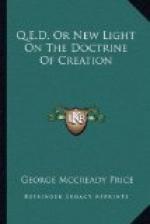IV
In conclusion we may attempt to speak in a brief way of the present relationship between the Creator and the things which He has made, and if possible to dispel the sad confusion prevailing in many minds between God’s continued immediate action in certain departments of nature and His action in other departments through the intermediate use of second causes.
On every hand we hear proclaimed a form of the doctrine of God’s omnipresence (usually called the divine “immanence”) which not only denies all distinction between the original Creation and the present perpetuation of the world, but a form which practically denies all second causes, and which cannot well be distinguished from pantheism, though it would be a spiritualistic or “idealistic” form of pantheism, or “monism,” to use the favorite modern term. These extreme advocates of what they term the divine “immanence” go so far as to deny all second causes. And while they are fond of proclaiming this idea as an entirely new discovery, and proclaiming it with all the enthusiasm of proselytes to a new religion, they are also prone to state the (seemingly) opposed doctrine of second causes in such a way that it amounts to a mere caricature, a burlesque, picturing a sort of “absentee” God, who started the universe running and now merely stands by and watches it go. Thus pantheism and deism are often spoken of as the only alternatives for the choice of the modern man; for the real teachings of the Bible and of Christian philosophy are as completely ignored as if they had never been formulated or taught by intelligent people.
Let us first consider the scientific aspects of the doctrine of second causes, and the doctrine of God’s immediate acting in various departments (or all departments) of nature.
1. We cannot deny that the will of man is a real cause, producing continual changes in the world about us. More than this, if there are not also second causes outside of the will of free intelligent personalities, the whole universe must be a gigantic deception; for it seems to be full of second causes. Long chains of what seem like second causes exist, made up of infinite numbers of links, as when the sun carries an amount of water up into the air, the latter dropping the water upon a mountain in the form of rain, gravity rolling it down the slope in vast force, sweeping away villages and towns, changing the fates of individuals and of nations. To quote two familiar examples from Stewart and Tait: “In a steam engine the amount of work produced depends upon the amount of heat carried from the boiler into the condenser; and this amount depends in its turn upon the amount of coal which is burned in the furnace of the engine. In like manner the velocity of the bullet which issues from the rifle depends upon the transformation of the energy of the powder; this in turn depends upon the explosion of the percussion cap; this again upon the fall of the trigger; and lastly this upon the finger of the man who fires the rifle."[54] Thus even the very strongest opponents of the idea of second causes never deny that the latter seem to surround us on every side, and that it would be possible to trace a continuous line of apparent effects and causes back to the very beginning.




